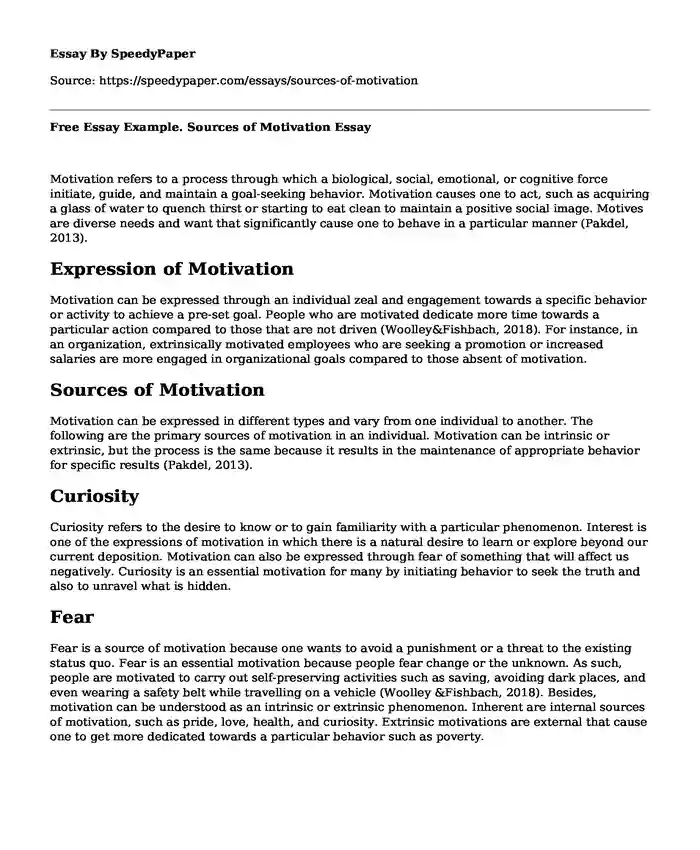
| Type of paper: | Essay |
| Categories: | Motivation Human behavior Emotional intelligence |
| Pages: | 3 |
| Wordcount: | 659 words |
Motivation refers to a process through which a biological, social, emotional, or cognitive force initiate, guide, and maintain a goal-seeking behavior. Motivation causes one to act, such as acquiring a glass of water to quench thirst or starting to eat clean to maintain a positive social image. Motives are diverse needs and want that significantly cause one to behave in a particular manner (Pakdel, 2013).
Expression of Motivation
Motivation can be expressed through an individual zeal and engagement towards a specific behavior or activity to achieve a pre-set goal. People who are motivated dedicate more time towards a particular action compared to those that are not driven (Woolley&Fishbach, 2018). For instance, in an organization, extrinsically motivated employees who are seeking a promotion or increased salaries are more engaged in organizational goals compared to those absent of motivation.
Sources of Motivation
Motivation can be expressed in different types and vary from one individual to another. The following are the primary sources of motivation in an individual. Motivation can be intrinsic or extrinsic, but the process is the same because it results in the maintenance of appropriate behavior for specific results (Pakdel, 2013).
Curiosity
Curiosity refers to the desire to know or to gain familiarity with a particular phenomenon. Interest is one of the expressions of motivation in which there is a natural desire to learn or explore beyond our current deposition. Motivation can also be expressed through fear of something that will affect us negatively. Curiosity is an essential motivation for many by initiating behavior to seek the truth and also to unravel what is hidden.
Fear
Fear is a source of motivation because one wants to avoid a punishment or a threat to the existing status quo. Fear is an essential motivation because people fear change or the unknown. As such, people are motivated to carry out self-preserving activities such as saving, avoiding dark places, and even wearing a safety belt while travelling on a vehicle (Woolley &Fishbach, 2018). Besides, motivation can be understood as an intrinsic or extrinsic phenomenon. Inherent are internal sources of motivation, such as pride, love, health, and curiosity. Extrinsic motivations are external that cause one to get more dedicated towards a particular behavior such as poverty.
Reward Oriented Motivation
A reward is a significant source of motivation that can be experienced in our daily activities and occupations. Rewarding activities initiates and maintains behavior that, in the end, results in a special reward (Woolley &Fishbach, 2018). For instance, one can change their diet to attain improved health. In this case, the award becomes a motivation towards a particular behavior or activity.
Motivation Theory and Social Behavior
Different theories can be used to understand motivation. For instance, the drive theory is based on a biological explanation of behavior in which it holds that behaviors are biologically motivated to meet certain urges of the body. Secondly, the humanistic theory of motivation is based on Abraham Maslow concepts of hierarchical human needs from the low-level psychological need such as thirst, sex, hunger and comfort to the highest level of need which is self-actualization (Pakdel, 2013). Therefore, the humanistic theory of motivation holds that human motives are driven by the need to achieve self-actualization, which is fulfilling work and creative living style.
In conclusion, motivation is a process caused by emotional, biological, and social agents that leads to the initiation and maintenance of behavior. Motivation is a goal-oriented behavioral philosophy that can be motivated by fear, reward, or one's curiosity. As such, motivation has a significant impact on how one behaves and their overall engagement in a particular activity.
References
Pakdel, B. (2013). The historical context of motivation and analysis theories of individual motivation. International Journal of Humanities and Social Science, 3(18), 240-247. Retrieved from http://www.ijhssnet.com/journals/Vol_3_No_18_October_2013/23.pdf
Woolley, K., &Fishbach, A. (2018). Underestimating the importance of expressing intrinsic motivation in job interviews. Organizational Behavior and Human Decision Processes, 148, 1-11. Retrieved from https://doi.org/10.1016/j.obhdp.2018.06.004
Cite this page
Free Essay Example. Sources of Motivation. (2023, Jan 22). Retrieved from https://speedypaper.net/essays/sources-of-motivation
Request Removal
If you are the original author of this essay and no longer wish to have it published on the SpeedyPaper website, please click below to request its removal:
- BRI Cybersecurity Risk Assessment Essay Example
- Free Essay: Social Psychology of Violence
- Essay Example about African Traditions
- Mellody Hobson on Cultural Identity. Speech Analysis Essay Sample.
- Comparison Essay Sample: Primary Education System in the UK with that of Kenya
- Free Essay on the Impact of Divorce on Children and Adolescents
- Essay Sample: Social Equity and Social Equality
Popular categories




